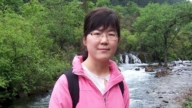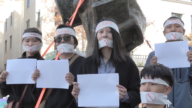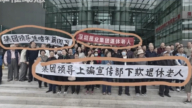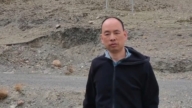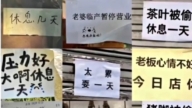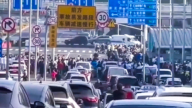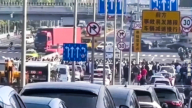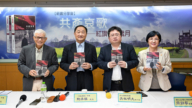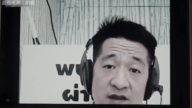【新唐人2012年11月21日訊】今年年中,河南周口市開展了大規模「刨祖墳」運動,已經「平遷200多萬墳墓,復種耕地近3萬畝」。「周口平墳」並不是孤立事件,在此之前,南陽等地也開展了平墳運動。在中國,有崇拜祖先的傳統,墳墓占有很重要的地位。這起「周口平墳」事件迅速引發了各方關注。
周口市古稱「周家口」,是伏羲的故都,老子的故里,素有「華夏先驅、九州聖跡」的美譽。不過,今年以來,河南省持續開展大規模「平墳運動」,各市縣被剷平的墳墓數以百萬計。一些學者迅速撰寫了《呼籲書》,要求必須立即停止「這起嚴重侵犯信仰自由、破壞中國文化、傷害民眾情感的野蠻行徑。」
在《呼籲書》上的近三百名簽單上,有秋風、蔣慶、吳飛等當代儒學復興呼籲者,也有清華大學教授許章潤、北京大學教授張千帆、作家崔衛平等自由派代表人物,甚至還有社科院學者于建嶸、律師丁錫奎這樣的基層維權運動推動者,還有在校學生等各界人士。
大陸自由撰稿人朱欣欣:「土葬是民間的習俗,由來已久,中共所宣傳的無神論這些觀點只能代表它們一黨的意識形態,不能強加於普通的民眾。社會的文化習俗是自然孕育發展而來的,無論對於否,我們應該予以尊重。」
《呼籲書》指出,古往今來,中國人堅信「祖有功,宗有德」,主張「敬天法祖,報本反始」,故在親人去世後必禮葬封墳、四時追祭﹔「死有所葬,入土為安」,乃是中國人所能設想的生命之最終歸宿和最後訴求,是中國人奉行孝道的終極體現和最基本要求。「平墳運動」,人神共憤,法理不容!
呼籲書認為,中共歷次的平墳運動,全盤摧毀了中國價值的基礎,導致了今日中國之亂象!
事實上,過去六十多年來,中共曾發起多次「平墳運動」,周恩來就曾帶頭平了自己父親和祖宗的墳。
不過,這次輿論界一致反對這場平墳運動。中共《人民日報》旗下的《環球時報》,就表達了「平墳運動可休矣」的立場﹔《南方週末》則質疑「平墳一定要簡單粗暴嗎?」此外,《人民網》、《新京報》等多家媒體,都發文表達了類似的態度。
民間也強烈對抗這種政策。周口地方施政者則以「停職、交紀委查處等方式威脅,還逼迫包括教師、公安、法官、幹部在內的公職人員帶頭平墳,並將平墳成績與考核、晉升掛鉤,對不願平墳的農民,一些地方威脅要停發低保、拘留甚至勞教。」
大陸自由撰稿人,原《河北人民廣播電臺》編輯朱欣欣表示,社會必須有民眾和社會組織一起參加治理,而中共權力思維的習慣,卻不考慮社會是與人民共有的。
大陸自由撰稿人朱欣欣:「專制體制一切以政治需求為出發點,它不考慮真正的文化傳統、百姓的民意,它不會考慮這些問題。所以,這種體制把所有的和官方需求不一樣的全部看作是自己的敵人。共產黨不斷的一代一代來培養自己的敵人,最後成了孤家寡人。」
事實上,中國的公共墓地價格急劇上升,動輒有報價幾百萬元的天價豪華墳墓被曝出,把昂貴的房價拋在了後面,火葬費也大幅攀升,民眾發出「死不起」的感歎。
廣東自由作家野火:「政府對墳墓的管理,它是集中管理,收費太昂貴,這是非常不好的。墓地按坪反算,是遠遠高過現在活人的土地。」
《法國國際廣播電臺》指出,讓死人集中居住騰出墓地,與賣地決定地方財政的模式是一樣的,在違背人倫天理背後,「平墳運動」所展示的是赤裸裸的利益邏輯。
採訪/陳漢 編輯/宋風 後製/王明宇
Razing Ancestral Graves Widely Outrages Chinese
A large-scale “ancestral grave-razing” movement has been
launched in mid-year in Zhoukou city, Henan Province.
So far, “over 2 million graves have been leveled off,
leaving empty nearly 30,000 MU(5000acres) of arable land.”
For the Chinese Communist Party authorities,
this is not an isolated issue.
Earlier on, the same movement had taken place
in Nanyang city.
Reverence of ancestral graves is deemed an important
part of traditional Chinese culture.
The issue of ancestral grave-razing in Zhoukou has now
aroused wide and intense public attention.
Zhoukou is known as a capital of ancient China and
the birth place of Lao Zi, founder of Taoism.
In recent years, the province has launched a massive
and ongoing “ancestral grave-razing” movement.
So far, millions of graves have been razed in the province.
Some scholars called for an immediate stop
to be put to this official action.
In an open letter, they have said that this is “barbarism”,
that “it seriously violates freedom of belief,
and that it ruins traditional Chinese
culture, and hurts public feelings."
Nearly 300 people signed the appeal letter. The signatories
range from advocates for reviving Confucianism,
professors at Tsinghua University and Peking University,
along with many writers, scholars, lawyers and college students.
Zhu Xinxin (Freelancer in China):
“Coffin burial is an age-old folk custom in China.
The CCP’s atheism is only its own party ideology,
which shouldn’t be imposed on the general public.
Socio-cultural practices were naturally developed and
we should respect them.”
The appeal letter states that through ages, the Chinese
have esteemed ancestral virtue and revered the Heavens.
They hold rituals when putting deceased relatives
in the coffin and burying it underground.
Traditionally, the Chinese believe that in this way,
body is finally laid to rest.
The Chinese view it as the last wish of a human life,
and a practice of showing filial piety to elders.
The appeal has said that the “ancestral grave-razing”
movement has outraged human decency and Heaven, and that it violates legal order.
The appeal points out that the CCP’s past grave-razing
movements destroyed the Chinese belief system, leading to social chaos in today’s China.
During over 60 years of rule,, the CCP has launched
several “ancestral grave-razing” movements.
Zhou Enlai, CCP’s former premier, once took the lead by
leveling off the graves of his father and his ancestors.
This time, China’s media has unanimously opposed
the movement.
The Global Times, under the People’s Daily newspaper,
has raised it’s voice to stop the practice.
The Southern Weekend newspaper questioned, “Must
grave-razing go on in such simple and rude approach?”
Web version of the People’s Daily, Beijing News and
other several media all shared the view.
Local public in Zhoukou strongly protested against this
official policy.
Local CCP authorities have forced civil servants
to take the lead in razing their ancestral graves.
They have been threatened with “suspension from duty”,
and are “undergoing investigation of the
discipline inspection commission”.
Even their salaries and promotion are affected by
their performance of grave-razing.
Those farmers who have resisted grave-razing have been
threatened with suspension of their subsistence allowance,
they are also threatened with detention and even with
being sent to reeducation through labor.
Zhu Xinxin comments that social administration should cover
the participation of citizens and of social organizations.
However, the CCP, with its power-struggle way of thinking,
never thinks society is for being shared with the people.
Zhu Xinxin: “Under it’s dictatorship, the regime does
everything in order to meet the needs of securing its rule.
It never considers national traditions and public opinions.
So, such a ruling system views all dissenters as its enemies.
Over generations, the CCP has developed
its own enemies, and now ends up a loner.”
Public cemetery prices have soared in China.
Reportedly, some luxury cemeteries cost
millions of yuan, far exceeding the price of a house.
Cremation charges in China have skyrocketed, also
Civilians there said that they “cannot afford to die”.
Ye Huo (Freelancer in Guangdong): “China’s public
cemetery is now under centralized management and with hefty fees, that’s very bad.
Cemetery charges per square meter are far higher
than that of property for a living soul.”
Radio France Internationale reviewed that
centralization of graves to vacate more lands is logically the
same as that of selling lands to generate local fiscal revenue.
That is, besides violating human ethics, “the ancestral
grave-razing” movement embodies sheer pursuit of interest.


